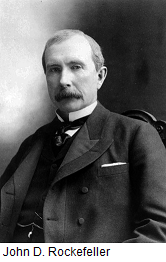Rockefellers get out of the family business
What would John Davison Rockefeller think about it all?
Earlier this week, the Rockefeller Brothers Fund announced that it was progressively divesting its investments in the fossil fuel industry and, instead, would divert the sale proceeds into renewable energy investments.
The Rockefellers joined other members of the Global Divest-Invest coalition, individuals, family trusts and businesses, which collectively hold more than $US50 billion in assets, that have pledged to divest from fossil fuels as part of global efforts to halt climate change.
In essence, the Rockefeller dynasty, founded upon the production, refining, transport and retailing of American crude oil by their great-grandfather John D. Rockefeller just short of 145 years ago, is getting out of the family business.
“We are immediately divesting from coal and tar sands, the most carbon intensive fuels,” said Stephen Heintz, an air of John D. Rockefeller and current president of the Rockefeller Brothers Fund. “It’s not a huge economic lever, but it does begin to send financial signals and it brings visibility to the issue. This is like a snowball, and it’s going to get more and more mass as it rolls forward.”
Managing an estimated $US860 million in assets, the Rockefeller Brothers Fund is an offshoot of the much larger Rockefeller Foundation, a trust which manages more than $US4bn in family money.
It was created as a philanthropic trust more than 100 years ago -- with a grants focus targeted on the areas of medicine, education and scientific research -- using the abundant money flowing from the oil wells and other industrial assets of John D. Rockefeller’s Standard Oil.
With Rockefeller investing more than $US550m into the foundation during his lifetime, he was able to grant substantial funds to major universities in America and around the world. Rockefeller Foundation money was also seen to be instrumental in research leading to the treatment of hookworm and yellow fever.
Founded in 1870 by John D. Rockefeller and several partners, including his brother William, Standard Oil rapidly evolved into the largest oil production and refining company in the world. From huge refineries, it produced close to 90 per cent of all the oil and kerosene used in the US during the late 1800s. It also held leases over vast tenements across the US, owned around 20,000 domestic wells, operated some 7000 kilometres of pipelines, and ran in excess of 5000 rail tank cars across the nation.
But being an oil behemoth was a dirty business, and it came at a price. In 1879 Rockefeller was indicted by the US government on charges of monopolising the oil trade, often through aggressive takeovers, and through such practices as underselling, differential pricing and secret transportation rebates. The US government changed legislation to stop his monopolisation of the oil industry, and the cartels that he helped form to block out, and destroy, any competitors brave enough to take on the Rockefeller might.
Rockefeller managed to fend off the government for years, but in 1911 the Supreme Court of the United States found that Standard Oil had violated the recently enacted Sherman Antitrust Act and ordered that his company be broken up into 34 new companies. The Standard Oil era was over, but through its break-up emerged a whole new string of oil companies, many of which are still around today. They included Continental Oil (now ConocoPhillips), Amoco (now part of BP), Esso (later Exxon), Mobil (now Exxon-Mobil) and Chevron.
Rockefeller had already retired by the time of the court’s break-up order but, because of it, as his oil assets were sold off to other companies, his personal wealth soared dramatically. In effect, the break-up of Standard Oil was his luckiest corporate break.
By the time of his death in 1937, Rockefeller was the world’s richest man. His personal wealth was estimated at $US1.4bn at that time, making him the first American billionaire. In today’s dollars, adjusting for inflation, estimates place his equivalent net worth in the range of $US392bn to $US663.4bn, a sum which would still easily make him the wealthiest person on the planet.
Oil was his passion; indeed, he once dreamed of controlling all the world’s oil refining. In later life, he realised that dream would never come to fruition.
But would Rockefeller have ever thought a day would come when his family would be getting out of oil?
In announcing the fossil fuels divestment program this week, Heintz said that there was no doubt Rockefeller would have been prepared to move away from the oil business.
“We are quite convinced that if he were alive today, as an astute businessman looking out to the future, he would be moving out of fossil fuels and investing in clean, renewable energy,” he said in a statement.
And that’s a lesson for every family business. Over time, trends do change. Adapting to that change can be done in multiple ways, but sometimes it means getting out of the business altogether and taking a different pathway. If it can happen to the Rockefellers, it can happen to anyone.
















